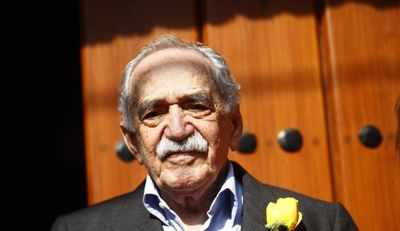- News
- entertainment
- malayalam
- movies
- ‘Gabriel Garcia Marquez had a huge impact on Malayalis and still does’
Trending
This story is from April 19, 2014
‘Gabriel Garcia Marquez had a huge impact on Malayalis and still does’

Life is not what one lived, but what one remembers and how one remembers it in order to recount it…
When Gabriel Garzia Marquez wrote this line in his Living to Tell the Tale, was he also referring to how the world will go on to remember him, whether he’s present in it or not? Thanks to translations, Gabo is as familiar here as Malayalam novelists, and no dementia can erase the impact.Mollywood too misses the magnificent author. His books were the stepping stones to the magic of the silver screen for many of its geniuses.
Filmmaker Dr Biju is still in the midst of receiving accolades for his film Perariyathavar’s performance at the National film awards; but he mourns the death of his beloved writer. “It is his works that opened the world of magnetic reading to me. The dreamy plots and narration were just too charismatic for the young reader in me, especially Love in the Time of Cholera. I am always charmed by his short stories, films based on his books, and autobiographical writings. Dementia may have gripped him and his body might be no more, but it doesn’t matter to his fans. He will be alive forever in our minds.”
When Marquez’s One Hundred Years of Solitude was launched in India, Director Rajeevnath was in Delhi. “I was there for a festival and bought 10 copies of the book. Once in Kerala, I gave it to many directors like Padmarajan and Aravindan and all of them where spellbound by that single text of magical literature,” recalls the filmmaker, who has apparently read every single work of Marquez. He even wishes to make a film based on the sequence in the book where the blood trail of Jose Arcadio crosses streets and rooms to reach his mother Ursula. “A few years ago, International Film Festival of Kerala (IFFK)had a package of films based on Marquez’s work and film buffs were extremely captured by his tales,” says Rajeevnath.
“Gabriel Garzia Marquez is no more. I remember the day when I read One Hundred Years of Solitude. It was sheer magic. Next was Love in the Time of Cholera. Two great souls whom I used to discuss this novel page by page are no more — Prof. K V Thampy and V K Unnikrishnan, who translated the novel into Malayalam. Those were magical days! I still believe that the best opening lines of a novel that I have ever read are from Chronicle of a Death Foretold. Adieu, Marquez, the eternal lover of love and death,” Unnikrishnan writes.
Lijo Jose Pelliserry, whose Amen has been described as the first experiment of magic realism in Malayalam cinema, says it was no coincidence. "Definitely, Gabo’s works have influenced my thoughts and works – the magic realism, the larger than life characters, fantasy and imaginary spaces. I did use a Marquezian landscape for Amen," he says. But then, Lijo has been an avid reader of Gabo much before I stepped into films; I’ve read almost all of his works, whether they be novels or short stories.
An interesting feature about his works is that us Malayalis can easily identify with many of their aspects, despite Columbia being a hemisphere away. The sensibilities are the same, we too have innumerable legends and supernatural tales borne out of a wild imagination, strong beliefs, huge families and a culture of family values, perhaps it also has to do with the strong Christian culture and its rituals in our state." But then, it is not easy to make a Gabo work directly into a film because it cannot be fit into a film’s canvas, he feels. "Gabo leaves it to each reader to use his imagination."
The younger generation of filmmakers are also great Gabo fans. Ohm Shanthi Oshaana’s script writer Midhun Manuel Thomas writes, “Adieu to Gabo. The Perumthachan of literature might be no more, but the Macondo and the imageries during cholera, which he sculpted with words, can never fade away. RIP legend, you and your magical realism will be long lived!” Marquez can’t die. He has left too many memories and moments behind.
When Gabriel Garzia Marquez wrote this line in his Living to Tell the Tale, was he also referring to how the world will go on to remember him, whether he’s present in it or not? Thanks to translations, Gabo is as familiar here as Malayalam novelists, and no dementia can erase the impact.Mollywood too misses the magnificent author. His books were the stepping stones to the magic of the silver screen for many of its geniuses.
Filmmaker Dr Biju is still in the midst of receiving accolades for his film Perariyathavar’s performance at the National film awards; but he mourns the death of his beloved writer. “It is his works that opened the world of magnetic reading to me. The dreamy plots and narration were just too charismatic for the young reader in me, especially Love in the Time of Cholera. I am always charmed by his short stories, films based on his books, and autobiographical writings. Dementia may have gripped him and his body might be no more, but it doesn’t matter to his fans. He will be alive forever in our minds.”
When Marquez’s One Hundred Years of Solitude was launched in India, Director Rajeevnath was in Delhi. “I was there for a festival and bought 10 copies of the book. Once in Kerala, I gave it to many directors like Padmarajan and Aravindan and all of them where spellbound by that single text of magical literature,” recalls the filmmaker, who has apparently read every single work of Marquez. He even wishes to make a film based on the sequence in the book where the blood trail of Jose Arcadio crosses streets and rooms to reach his mother Ursula. “A few years ago, International Film Festival of Kerala (IFFK)had a package of films based on Marquez’s work and film buffs were extremely captured by his tales,” says Rajeevnath.
His influence has been evident in recently released Malayalam films as well. The tagline of Geeyen Krishnakumar’s Kaanchi reads — Tale of a Death Foretold — inspired by Marquez’s Chronicle of a Death Foretold. “It was a statement quite in sync with the mood of our film,” says Krishnakumar, who is a selfconfessed fan of the writer. “He had a huge impact on Malayalis and still does,” he observes. B Unnikrishnan is busy with his film Mr Fraud, but he took out a moment to mourn the loss, on his online forum.
“Gabriel Garzia Marquez is no more. I remember the day when I read One Hundred Years of Solitude. It was sheer magic. Next was Love in the Time of Cholera. Two great souls whom I used to discuss this novel page by page are no more — Prof. K V Thampy and V K Unnikrishnan, who translated the novel into Malayalam. Those were magical days! I still believe that the best opening lines of a novel that I have ever read are from Chronicle of a Death Foretold. Adieu, Marquez, the eternal lover of love and death,” Unnikrishnan writes.
Lijo Jose Pelliserry, whose Amen has been described as the first experiment of magic realism in Malayalam cinema, says it was no coincidence. "Definitely, Gabo’s works have influenced my thoughts and works – the magic realism, the larger than life characters, fantasy and imaginary spaces. I did use a Marquezian landscape for Amen," he says. But then, Lijo has been an avid reader of Gabo much before I stepped into films; I’ve read almost all of his works, whether they be novels or short stories.
An interesting feature about his works is that us Malayalis can easily identify with many of their aspects, despite Columbia being a hemisphere away. The sensibilities are the same, we too have innumerable legends and supernatural tales borne out of a wild imagination, strong beliefs, huge families and a culture of family values, perhaps it also has to do with the strong Christian culture and its rituals in our state." But then, it is not easy to make a Gabo work directly into a film because it cannot be fit into a film’s canvas, he feels. "Gabo leaves it to each reader to use his imagination."
The younger generation of filmmakers are also great Gabo fans. Ohm Shanthi Oshaana’s script writer Midhun Manuel Thomas writes, “Adieu to Gabo. The Perumthachan of literature might be no more, but the Macondo and the imageries during cholera, which he sculpted with words, can never fade away. RIP legend, you and your magical realism will be long lived!” Marquez can’t die. He has left too many memories and moments behind.
End of Article
FOLLOW US ON SOCIAL MEDIA









